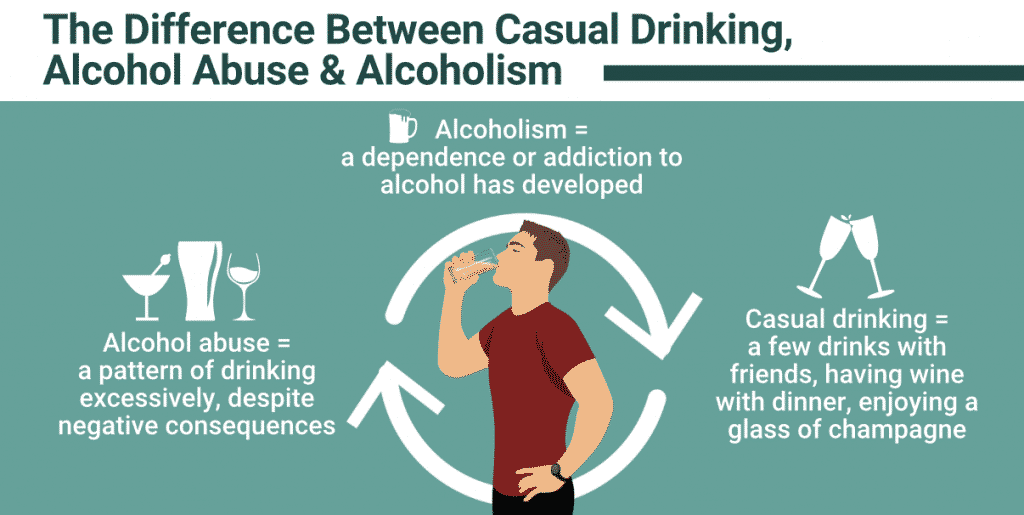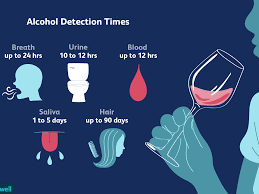Have you ever had a drink and felt like it was too much? Have you ever had more than one drink in an hour, or had more drinks at a time than your friends? If so, then these might be signs that you have a drinking problem. Alcohol addiction is a serious issue that affects many people around the world. In this blog post, we will discuss what alcoholism is, how to know if you are addicted to alcohol. We will also suggest what steps to take next. Including taking the “Am I alcoholic test” and more!
Contents
- 1 Understanding Alcohol Addiction
- 2 Decoding Alcohol Addiction Test
- 3 Questions To Ask Me Before Am I Alcoholic Test
- 4 The Procedure of Taking Alcohol Addiction Test
- 5 Take The Alcohol Addiction Test (AUDIT)
- 6 Result And Interpretations
- 7 Handling Results
- 8 Treating Alcohol Addiction
- 9 Conclusion
- 10 A Word From Therapy Mantra
Understanding Alcohol Addiction

Alcohol addiction is a condition where the person cannot stop drinking alcohol. Even if it causes harm to their life. Alcoholism is an illness that can affect anybody in any walk of life. Fun-loving people can become addicted as easily as someone who has mental problems or other issues, such as stress and depression.
Degrees of Alcohol Addiction
There are different degrees of alcohol addiction, and not all cases are the same. The following are three degrees of alcohol addiction:
Mild Alcohol Addiction: This is where a person drinks moderately most days but has episodes where they drink more than usual. They may also experience blackouts or memory loss after drinking.
Moderate Alcohol Addiction: This is where a person drinks more than they should regularly, experiences withdrawal symptoms such as sweating, shaking, and nausea when they don’t drink, and may have damaged relationships or job problems because of their drinking.
Severe Alcohol Addiction: This is the most serious form of alcohol addiction, where the person can no longer control their drinking and needs alcohol to function. They may have lost jobs, relationships, and even their home because of their addiction.
Types of Alcohol Addiction
There are different types of alcohol addiction:
Psychological Alcohol Addiction: This is where a person drinks to cope with emotional problems such as stress, anxiety, or depression.
Physical Alcohol Addiction: This is where a person drinks because their body has become dependent on alcohol and they need it to function.
Social Alcohol Addiction: This is where a person drinks mainly in social situations and feels like they can’t have fun without drinking.
Symptoms of Alcoholism or Alcohol Dependence

Physical symptoms:
- tremors,
- blackouts, or
- memory loss after drinking alcohol,
- withdrawal symptoms when trying to quit drinking (such as nausea or anxiety), and
- a need for increased amounts of alcohol to feel the same effect.
Behavioral symptoms:
- frequent intoxication even after drinking small quantities of alcohol,
- being unable to limit your intake no matter how much you drink,
- hiding that you have been consuming an excessive amount of alcohol, and
- missing appointments or being late to events due to your drinking.
Mental symptoms:
- difficulty concentrating,
- memory problems,
- a strong desire for the next drink even while intoxicated (known as craving), and
- losing interest in previously enjoyed activities such as exercise.
Causes Of Alcohol Addiction
The exact causes of alcohol addiction are not fully understood. However, it is thought that the repeated use of alcohol can cause chemical changes in the brain and body. Thus it makes someone more susceptible to developing an alcohol problem over time. This makes sense because genetics play a role in whether or not you will become addicted to drugs. So if your parents have addictive tendencies then there is a greater chance that you will too.
The use of alcohol is also thought to be associated with the release and activation of certain brain chemicals which can result in addiction. These include dopamine, serotonin, GABA (gamma-aminobutyric acid), glutamate, acetylcholine, and oxytocin. The role of GABA and glutamate is thought to be particularly relevant, given the importance of these brain chemicals in the reward pathway.
Types of Alcohol Addiction Tests
Several different types of alcohol addiction tests may be administered to determine whether or not someone has an issue with their drinking. These include Alcohol:
Breath test: This test is used to measure the alcohol levels in a person’s breath, and may also be called an “alcohol screening.” The results of this type of screen can determine whether or not you should take further tests.
Blood test: This measures the amount of alcohol that is circulating through your bloodstream. It will tell if there are any high amounts of alcohol in your system.
Alcohol saliva test: This is a newer form of testing, which can be done quickly in the office or at home with an over-the-counter kit. Saliva alcohol tests detect both short-term (BAC) and long-term (TAC) alcohol levels.
Urine test: This may also be called a “chemical screen.” It tests for metabolites and other substances that result from drinking such as acetone and sugar levels. This may also be called a “chemical screen.” It tests for metabolites and other substances that result from drinking such as acetone and sugar levels.
Side Effects From Taking An Alcohol Addiction Test
No, there aren’t any side effects associated with taking an alcohol addiction test. Because the tests themselves do not directly involve needles or injections of any kind. However, you may feel upset or frustrated by the results of your test. If you are concerned about side effects, discuss them with a healthcare professional before taking any alcohol addiction tests.
Risks of Alcohol Addiction

The risks from drinking too much alcohol are very real – it can cause a great deal of damage to your physical health including liver disease or cancer as well as an increased risk of developing several mental illnesses.
The risk increases with the amount and frequency of alcohol being consumed, as well as if you are smoking along with using alcohol (which is known to increase your chances of developing cancer or other diseases).
Another important factor that can influence the risks associated with drinking too much is whether or not someone has a family history of alcoholism or alcohol use disorders. The risks of drinking too much are:
Physical Health
- Damage to the liver, pancreas, and brain can cause permanent physical disabilities including losing your job due to being unable to work. It is also the leading cause of death in people between 15-34 years old (WHO).
- Increased risk for heart disease includes a greater likelihood of having high blood pressure or coronary artery disease which can lead to stroke or heart attack. It is also thought that drinking too much alcohol may raise your chances of developing an irregular heartbeat (atrial fibrillation).
- Increased risk of developing cancers of the mouth, throat, voice box (larynx), esophagus, stomach, colon, and breast.
Mental Health
- There are also certain types of mental health issues that may result from alcohol use disorders such as depression, anxiety disorder, mood disorders including bipolar disorder and psychosis.
Overall Well-being
- Additionally, those who have an alcohol addiction will likely experience problems with their relationships and employment.
Decoding Alcohol Addiction Test
The alcohol addiction test is a questionnaire that asks you questions about your drinking habits. The answers will tell if you are at risk of developing an alcoholism problem.
There are several ways to test for alcohol addiction as discussed above. A simple way is the CAGE questionnaire, which stands for:
- C-Have you ever felt the need to Cut down on your drinking?
- A-Have people Annoyed you by criticizing your drinking?
- G-Do you feel Guilty about your drinking?
- E-Do you need an Eye-opener (a drink first thing in the morning) to start your day?
It is then followed by a more in-depth interview where you can answer questions about your drinking habits. In some cases, there may be blood or urine tests performed to make sure that your body is not in the process of absorbing alcohol. It’s also important you tell the counselor about any mental health issues or substance abuse problems you may have. Because these can affect the results of an alcohol addiction test as well.
NOTE: If you answer yes to two or more questions in this test, it might be time to seek professional help from an addiction specialist.
Information I Get From Alcohol Addiction Test
The alcohol addiction test (am I an alcoholic test) will give you a better understanding of your drinking habits and whether or not you have an alcohol addiction. It will also provide information on the severity of your addiction and what steps to take next.
The Reason I Take Alcohol Addiction Test
There are several reasons why you should take an alcohol addiction test (am I an alcoholic test). To:
- Get a better understanding of your drinking habits
- Find out if you have an alcohol addiction
- Learn about the severity of your addiction
- Get information on what steps to take next
The Time I Take Alcohol Addiction Test

The best time to take the alcohol addiction test (am I an alcoholic test) is when you feel ready to face the truth about your drinking. You may want to take it with a friend or family member so that you can get their feedback and support.
Rough Idea of Alcohol Addiction Test
The alcohol addiction test (am I an alcoholic test) will ask you questions about your drinking habits, such as how much and how often you drink. It will also ask about your feelings and thoughts about alcohol, such as whether you feel like you need it to function or if you drink mainly in social situations.
Time It Takes To Complete Alcohol Addiction Test
The time it takes for an alcohol addiction test (am I an alcoholic test) to be completed will vary depending on the type of exam you are undergoing. Some tests can take as little as ten minutes. But others may take up to an hour or more. The amount of time it takes for a blood sample to return accurate results is usually 15-30 minutes while urine samples generally need one and half hours before they are ready to be analyzed.
Accuracy of Alcohol Addiction Test
The accuracy of the alcohol addiction test depends on how honest you are with your answers. If you are not truthful, then the results may not be accurate.
Questions To Ask Me Before Am I Alcoholic Test
Before you take the alcohol addiction test, ask yourself these questions:
- Are you prepared to face the truth about your drinking habits?
- What do others think of my drinking habits?
- Do you want support from others when facing this information?
- What will happen if I don’t answer all questions honestly?
The Procedure of Taking Alcohol Addiction Test
There is no special procedure to follow when taking the alcohol addiction test. Simply read through the questions and answer them honestly. Don’t worry too much about how you word your answers. Just give as honest a response as possible. You mustn’t leave any questions unanswered because this will skew the results.
If I Choose Not To Take Alcohol Addiction Test
If you choose not to take the alcohol addiction test, then you must be honest with yourself and others about your drinking habits. This may be difficult at first but ultimately being truthful can help you get better control of your life. It’s also important to remember that you are not alone and there is help available for those who need it.
Take The Alcohol Addiction Test (AUDIT)
The first thing you will need to do is print out the Alcohol Use Disorders Identification Test (AUDIT) questionnaire. This must be done on a computer because it is available in multiple languages, which can make printing very difficult if not impossible.
After printing the AUDIT questionnaire, fill out only those questions that apply to your drinking habits. Remember that the more honest you are with yourself, the better chance you have at recovery.
The next thing to do is answer each question by circling one of four numbers: “0” (never), “l” (rarely), “m” (sometimes), or “r” (often). Once all ten questions have been answered, add up the numbers that you circled and write that number in the designated space on the questionnaire.
After calculating your score, look at the following table to see what it means:
Score Interpretation
- 0-14 No alcohol problems
- 15-19 Mild problem
- 20-39 Moderate problem
- 40 and above Severe problem
NOTE: If you are considering taking an Alcohol Use Disorders Identification Test (AUDIT), it is important that you first ask yourself some questions about your drinking habits and readiness to face the truth. The accuracy of an Alcohol Use Disorders Identification Test (AUDIT) scales with the respondent’s willingness to answer questions about their drinking honestly. Consequently, individuals who score high on AUDIT scales likely have more severe alcohol use disorders than those who score low.
Sample Questions of Alcohol Addiction Test (AUDIT)
The AUDIT questionnaire is designed to screen for alcohol misuse and dependence. It consists of ten questions that ask about frequency, quantity, and consequences of alcohol use. Below are some sample questions from the AUDIT questionnaire.
- How much do you drink in a day/week/month?
- Do you feel like you need alcohol to function?
- Do you mainly drink in social situations?
- What do you think of alcohol? Do you consider it to be a problem in your life?
- So how much does drinking cost you each month (delayed expenses, hospital bills, and legal fees)?
- How many times have you driven under the influence of alcohol? And how often are these accidents caused by your intake of alcohol? Have any people been injured as a result of your drinking?
- When was the last time you drank alcohol and when will be the next time?
- Do you feel like you need to drink more alcohol to get the desired effect? Do you sometimes feel like you’ve had too much?
NOTE: Individuals who score high on AUDIT scales likely have more severe alcohol use disorders than those who score low.
Result And Interpretations
The result of the alcohol addiction test (am I an alcoholic test) will provide you with a score that reflects your level of alcohol addiction. This score can then be used to determine the severity of your addiction and what type of treatment is most appropriate for you.
It’s important to remember that taking an alcohol addiction test (am I an alcoholic test) is just one step on the road to getting better control of your life. There are many resources available to those who need help, including counseling and support groups. Don’t be afraid to ask for help if you feel like you can’t handle your alcohol addiction on your own.
NOTE: After you have completed the alcohol addiction test, it’s important to consult with a counselor or therapist who can help you understand the results. They will be able to provide you with information about treatment options and resources that are available to you. It is also important to remember that there is no one-size-fits-all approach to treating alcoholism. Rather the severity of your addiction will determine the type of treatment that is most appropriate for you.
Handling Results
If your alcohol addiction test results indicate that you are at a moderate or severe level, you may want to consider getting help from an alcohol use disorder treatment program. These programs can give qualified individuals the tools and skills they need for long-term recovery.
Inpatient Treatment Programs
Inpatient treatment programs are appropriate for individuals who have a serious alcohol addiction. These programs provide 24-hour supervision by medical staff as well as group therapy sessions. That helps patients deal with the behaviors associated with their addiction.
Outpatient Treatment Programs
Outpatient treatment programs are less restrictive than inpatient programs and allow patients to live at home while attending therapy sessions. This type of program is appropriate for those with a mild or moderate addiction to alcohol.
Rehabilitation Centers
Rehabilitation centers offer both inpatient and outpatient treatment options for individuals with an alcohol use disorder. Inpatient programs provide a safe and controlled environment for patients who need close supervision as they go through withdrawal. Outpatient treatment allows individuals to live at home while attending therapy sessions in the community.
Treating Alcohol Addiction
There is no one-size-fits-all approach to treating alcoholism. The severity of your addiction will determine the type of treatment that is most appropriate for you. However, a few options that can consider:
Counseling and Therapy
Counseling is a process in which a therapist helps you to identify and understand the factors that may have contributed to your alcohol addiction. It can also help you develop new coping skills and strategies for dealing with stressful situations.
Therapy is a more intensive form of counseling that usually lasts for a longer period. In therapy, you will work with a therapist to identify the thoughts, feelings, and behaviors that are contributing to your alcohol addiction. You will also learn how to replace these negative patterns with more positive ones.
Support Groups
Alcoholics Anonymous (AA) is a 12-step support group that has been helping individuals with alcohol use disorders since its inception in the 1930s. Twelve-step programs are based on the idea that working together can help members become sober and stay sober. Members typically meet weekly to discuss their struggles, share experiences, and give support to one another (AA World Services).
There is also an organization called Moderation Management that provides support for those who have chosen to moderate their alcohol consumption. This program is based on the idea that moderation can be achieved without abstaining from all forms of alcohol use and that it’s possible to drink in a responsible manner (Moderation Management).
Step-Wise Treatment
There are three main types of step-wise treatments for alcohol addiction:
Abstinence-based treatment: This type of treatment requires individuals to completely abstain from all forms of alcohol consumption.
Controlled drinking: In this type of treatment, individuals are allowed to drink in a controlled manner, under the supervision of a health professional.
Harm reduction: This approach allows individuals to continue drinking in a controlled manner, but also provides support for reducing the negative consequences associated with alcohol use.
NOTE: Which type of step-wise treatment is best for you will depend on your situation and the severity of your addiction.
Medication Treatment
Medication treatment is not always necessary, but it can be helpful for those who have struggled with alcohol addiction in the past and are now trying to maintain sobriety. The three types of medication are commonly used to treat alcohol addiction:
Antabuse: This drug works by causing you to experience nausea or other negative symptoms if you consume alcohol while taking it. It is intended for those who have already committed to a period of sobriety but are struggling with the temptation to drink again.
Paxil and Zoloft (antidepressants): These drugs are prescribed to individuals who have struggled with alcohol addiction in the past, but are now sober. They work by reducing the risk of relapse and helping to maintain abstinence.
Naltrexone: This drug is used to help reduce cravings for alcohol and can be taken either orally or through an injection.
NOTE: This information is not a substitute for professional medical advice. If you are struggling with alcohol addiction, it is important to seek help from a healthcare professional.
Conclusion
Alcohol abuse is a serious issue that can lead to life-threatening consequences if left untreated. Fortunately, there are treatment options available for those who want to recover from an alcohol use disorder. If you have had trouble with alcohol in the past and would like help quitting drinking once and for all. Then consider enrolling in a rehabilitation program or seeking guidance from a support group.
A Word From Therapy Mantra
Your mental health — Your psychological, emotional, and social well-being — has an impact on every aspect of your life. Positive mental health essentially allows you to effectively deal with life’s everyday challenges.
At TherapyMantra, we have a team of therapists who provide affordable online therapy to assist you with issues such as depression, anxiety, stress, workplace Issues, addiction, relationship, OCD, LGBTQ, and PTSD. You can book a free therapy or download our free Android or iOS app.


